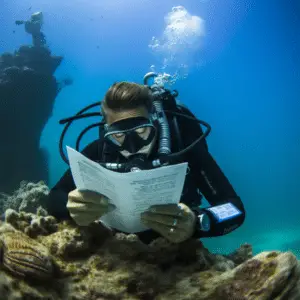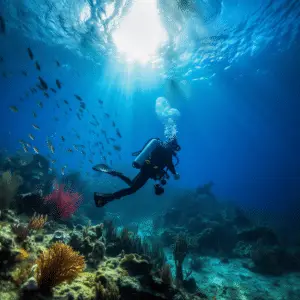
Scuba diving is an exciting activity to explore the underwater world. You must have certifications to join in on this thrilling adventure. These certifications make sure you have the skills and knowledge to dive safely.
The certifications are split into different levels. The entry-level one is the Open Water Diver. This certification teaches you to dive up to 60 feet deep and how to use equipment, plan dives, and communicate underwater.
As your experience and confidence increases, you can progress to Advanced Open Water Diver or Rescue Diver certifications. These certifications teach you new techniques and scenarios, like night dives or wreck dives.
If you want to explore deeper and more challenging sites, you can pursue certifications like Deep Diver or Technical Diver. These require a lot of training and practice to handle the extra depth and risks.
To make the most of your scuba diving journey, pick a reliable diving school and certified instructor who puts safety first. This will give you a good foundation for all your underwater adventures.
What is scuba diving certification?
Scuba diving certification is the way to get a license to dive alone and discover the underwater world. This is to guarantee that divers got the right training to manage the difficulties of scuba diving.
Different levels of certification exist to fit the skill of the diver. They give the knowledge and abilities to go through underwater environments. Each level helps build up the previous one, allowing divers to explore deeper depths and difficult diving conditions.
An example is the Open Water Diver certification, which is an introductory certification. It trains divers in buoyancy control, gear management, and dive planning. As divers gain experience, they can move on to Advanced Open Water Diver, which gives new methods and dives up to 100 feet deep.
For further advanced training, there are certifications like Rescue Diver and Divemaster. These focus on sharpening leadership skills and teaching divers on how to act in emergency situations. They also provide chances for divers to help instructors train new divers.
The beginning of scuba diving certification is several decades old when recreational diving became popular. To secure the safety of divers, organizations like PADI (Professional Association of Diving Instructors) created standardized training programs. These have been changed with time, using advancements in equipment and techniques.
Why is scuba diving certification important?
Scuba diving certifications are highly important due to the risks associated with underwater exploration. By obtaining certification, divers learn the knowledge and skills needed to ensure safety. It shows their competence, and understanding of important principles like equipment usage, buoyancy control, and emergency procedures.
Moreover, certification allows divers to explore underwater environments with confidence. The training they receive equips them with the ability to navigate different aquatic ecosystems and experience marine life up close. It gives them a chance to explore a wonderful and peaceful world that would otherwise be inaccessible.
Certification also proves that they meet industry-recognized standards. These standards regulate safe diving practices, and are the same worldwide. By following them, divers help keep the sport safe and protect fragile marine ecosystems. In addition, it gives access to dive centers, charters, and resorts globally by proving credibility.
To illustrate the importance of scuba diving certification, consider Jacques Cousteau. An iconic pioneer in underwater exploration, he saw unfortunate accidents caused by untrained divers. Inspired by this, he founded The Professional Association of Diving Instructors (PADI), to create standardized dive training programs globally. This initiative changed scuba diving education, and showed how important certifications are for safe exploration in the oceans.
Different levels of scuba diving certifications
Scuba diving certifications give divers multiple levels of proficiency and training to investigate the underwater world safely. Let’s plunge into the various levels:
- Open Water Diver: Entry-level cert which allows you to dive to 60 feet solo.
- Advanced Open Water Diver: Building on Open Water Diver, this cert lets you dive deeper and explore specialties like night diving or wreck diving.
- Rescue Diver: Enhances safety awareness and rescue abilities, with a focus on preventing and managing diving emergencies.
- Divemaster: Allows you to help instructors teach new divers and lead certified divers on diving trips.
- Instructor: Highest level of certification. Train to teach others scuba diving and share your love for the underwater world.
To become a scuba guru, continue learning after these basics. Try underwater photography, marine preservation, or technical diving. But always remember: safety is top priority when underwater.
Pro Tip: As you go through scuba diving certifications, take time to get experience and practice regularly. This will boost your confidence and make you a better diver.
How to obtain scuba diving certifications
Ready to get your scuba diving certification? Here’s a guide to help you get started:
- Research dive centers and instructors. Look for reputable ones with good credentials, reviews, and safety records.
- Choose an agency, such as PADI, NAUI, or SSI. Pick one that has international recognition.
- Enroll in a beginner’s course. Learn about essential skills, equipment usage, safety procedures, and dive planning.
- Complete knowledge development. Study dive physics, physiology, equipment maintenance, underwater navigation, dive planning, emergency procedures, and environmental awareness.
- Master practical skills. Practice buoyancy control, mask clearing, regulator recovery, underwater communication signals, and emergency ascents.
- Open water dives and certification. Demonstrate your abilities during a series of open water dives. Successfully complete them, and you’ll receive your cert!
Don’t forget to stay up-to-date by taking refresher courses or advanced-level certifications. Then, you’ll be ready to explore the underwater world! Start your journey today
.
Conclusion
Scuba diving certifications come in different levels. Each signifies the training and underwater expertise of the diver. From beginner Open Water Diver to advanced Divemaster and Instructor, there is something for everyone.
Divers gain knowledge as they progress and learn vital skills to explore deeper dive sites and handle tricky situations. Certifications also open up opportunities for activities like night diving, wreck diving, and deep diving.
A noteworthy detail is that some certifications require a certain number of logged dives before advancement. This ensures divers have enough experience in various conditions to move on.
Also, these certifications are recognized worldwide by organizations like PADI and SSI. This allows certified divers to dive at many locations around the world.
Scuba diving has a long history. The first record of humans underwater goes back to ancient civilizations like the Mesopotamians. Over time, advances in tech and equipment made modern scuba diving accessible to all.
Frequently Asked Questions
Q: What are the different levels of scuba diving certifications?
A: There are several levels of scuba diving certifications, including:
1. Open Water Diver: This is the entry-level certification that allows divers to dive independently with a buddy to a depth of 60 feet.
2. Advanced Open Water Diver: This certification builds upon the Open Water Diver certification and offers specialized training in various diving activities, allowing divers to explore different types of dives.
3. Rescue Diver: The Rescue Diver certification focuses on developing the necessary skills to prevent and manage diving emergencies, making divers more prepared to assist others in distress.
4. Dive Master: Dive Masters are certified to lead and supervise dive activities, assist instructors, and help with diver training.
5. Assistant Instructor: This certification allows divers to begin teaching scuba diving courses under the supervision of a certified instructor.
6. Instructor: The Instructor certification qualifies individuals to teach scuba diving independently and conduct various diving courses.
